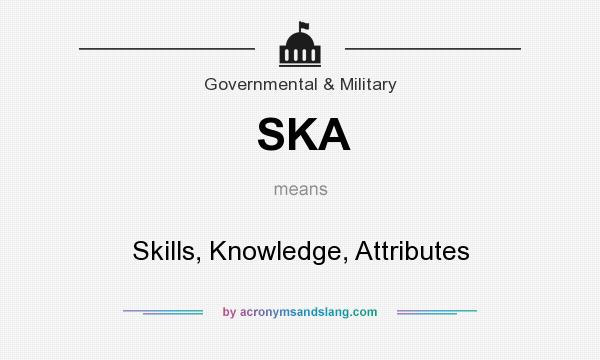What does SKA mean?
SKA means Skills, Knowledge, Attributes
This acronym/slang usually belongs to Government & Military category.
What is the abbreviation for Skills, Knowledge, Attributes?
Skills, Knowledge, Attributes can be abbreviated as SKA

|
|
Most popular questions people look for before coming to this page
| Q: A: |
What does SKA stand for? SKA stands for "Skills, Knowledge, Attributes". |
| Q: A: |
How to abbreviate "Skills, Knowledge, Attributes"? "Skills, Knowledge, Attributes" can be abbreviated as SKA. |
| Q: A: |
What is the meaning of SKA abbreviation? The meaning of SKA abbreviation is "Skills, Knowledge, Attributes". |
| Q: A: |
What is SKA abbreviation? One of the definitions of SKA is "Skills, Knowledge, Attributes". |
| Q: A: |
What does SKA mean? SKA as abbreviation means "Skills, Knowledge, Attributes". |
| Q: A: |
What is shorthand of Skills, Knowledge, Attributes? The most common shorthand of "Skills, Knowledge, Attributes" is SKA. |
Abbreviations or Slang with similar meaning
- SKOPE - ESRC Centre on Skills, Knowledge and Organisational Performance
- SKRAM - Skills, Knowledge, Resources, Authority, Motive
- SKAP - Skills, Knowledge, and Abilities Profile
- CKSA - Common Knowledge, Skills and Attributes
- SKT - Skills, Knowledge, and Tools
- SKE - Skills, Knowledge and Experience
- SKA - Skills, Knowledge & Ability
- ASK - Attitude Skills Knowledge
- SKA - Skills Knowledge Abilities
- SKA - Skills Knowledge and Aptitudes
- SKA - Skills Knowledge Attitude
- SKAs - skills, knowledge and abilities
- SKB - skills knowledge behavior
- SKT - Skills Knowledge Test
- ask - Activity, Skills, Knowledge
- ask - Activities Skills Knowledge
- ksa - Knowledge-Skills-Attributes
- skam - Skills, Knowledge, Access and Motive
- ASK - Activity, Skills, Knowledge. Super acronym for training and development, especially sales and account management, since these three components are essential for success and productive performance. Arguably the order should be Knowledge, Skills, Activity,
- KAS - Knowledge, Attitude, Skills. The constituents required for people to succeed at what they do, individually and collectively. Knowledge and Skills can largely be trained; Attitude can't - it's a factor of personality, emotion, personal circumstances, and t